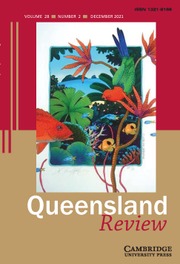No CrossRef data available.
Article contents
The Poor Parsons: Presbyterian Clergy in Colonial Queensland
Published online by Cambridge University Press: 26 February 2016
Extract
An examination of the Presbyterian ministry in colonial Queensland is a revealing exercise. It tells something of the nature of a very significant class in colonial society, the clergy, who acted as the “public intellectuals” of their age. It aids the assessment of the extent to which the Presbyterian Church remained an immigrant Scottish institution. It also provides some insights into the causes of the differences of style observable in Presbyterianism from state to state, suggesting a relationship to differences over Church union in the 1970s.
- Type
- Research Article
- Information
- Copyright
- Copyright © Cambridge University Press
References
Endnotes
1 In other places, the writer has examined various aspects of Presbyterian history in the Australian colonies. Prentis, M. D., ‘Colonial Ecumenism: Aspects of Presbyterian Reunion in New South Wales, 1865’, Church Heritage, 1,3 (1980), pp.219–239; ‘Changes in Presbyterian Worship in Colonial Australia,’ Church Heritage, II, 1 (1981), pp.46–57; The Scots in Australia: a Study of New South Wales, Victoria and Queensland, 1788–1900, Sydney 1983, Ch. 10; ‘The Presbyterian Ministry in Australia, 1822–1900: Recruitment and Composition’, The Journal of Religious History, 13, 1 (June 1984), pp.46–65.Google Scholar
2 Chambers, D., Theological Teaching and Thought in the Theological Hall of the Presbyterian Church of Victoria 1865–1906, (Parkville, Vic. 1967), pp.1–5; Cameron, J., Centenary History of the Presbyterian Church in New South Wales, (Sydney 1905), pp.172–173; Bardon, R., The Centenary History of the Presbyterian Church of Queensland, (Brisbane 1949), pp.34–41.Google Scholar
3 Davis, E. D., The Life and Tilnes of Steel Rudd (Melbourne, 1968) Chs. 1 and 2.Google Scholar
4 Rudd, S., The Poor Parson (1907; reprinted St Lucia, Qld, 1968) p.1.Google Scholar
5 Waterson, D. B., Squatter, Selector, and Storekeeper: A History ofthe Darling Downs 1859–1893 (Sydney, 1972), pp.134–135.Google Scholar
6 The Poor Parson, p.54.Google Scholar
7 ibid., p.3.Google Scholar
8 ‘Life Story of Colin McIntyre 1854–1935’, p.1 (by courtesy of Mr I. McIntyre, Sydney).Google Scholar
9 ibid., p.3.Google Scholar
10 Rudd, S., Duncan McClure (Sydney, 1909, pp.I-2), reprinted in The Poor Parson (St Lucia, Qld, 1968), pp. 247–248.Google Scholar
11 Angus, C., ‘Growing up on the Croft’, The Scots Magazine, May 1974, p.150.Google Scholar
12 Rudd, S., Dad in Politics (1908, reprinted St. Lucia, Qld, 1968) pp.69–70.Google Scholar
13 Putnis, P., Steele Rudd's Australia (Toowoomba, 1988), p.61; Davis, E., (ed) Introduction to The Poor Parson (1968).Google Scholar
14 Hodgson, C. P., Reminiscences of Australia with Hints on the Squatter's Life (London, 1846), p.118.Google Scholar
15 McIntyre, D., ‘His Reminiscences’, TS., p.5 (by courtesy of Mr I. McIntyre).Google Scholar
16 Bardon, R., Centenary History, pp. 214,230; Minutes and Proceedings of the General Assembly of the Presbyterian Church of Queensland, 1933.Google Scholar
17 See Prentis, M. D., ‘The Presbyterian Ministry’, pp. 5, 57–61.Google Scholar
18 For the sources of the statistics, see Prentis, M. D., ‘The Presbyterian Ministry,’ pp.56ff, and Prentis, M. D., ‘A Biographical Register of Presbyterian Ministers in Queensland 1847–1900,’ Church Heritage, 9, 2 (September 1995), pp.100–124.Google Scholar
19 Anderson, A. C., The Story of the Presbyterian Church in Ireland, Belfast 1965, pp.88–89. The 1859 Revival was an important influence in the formative years of many of Australia's Irish clergy.Google Scholar
20 Ibid., pp.65–67, 82. The Presbyterian Church in Ireland formally purged itself of these heterodox influences in the mid-nineteenth century.Google Scholar
21 Mackie, G. to Kinross, J., 8 May 1863, Kinross Papers, Box 4, N.L.A. The Rev. Dr A. C. Geikie disrespectfully called them ‘Paddies’.Google Scholar
22 Those of humble birth were presumably less likely to make known the occupations of their fathers.Google Scholar
23 Minister-fathers are by far the easiest to discover. The proportion was highest in Victoria.Google Scholar




